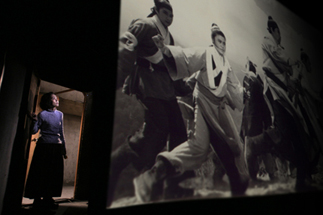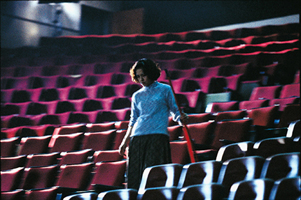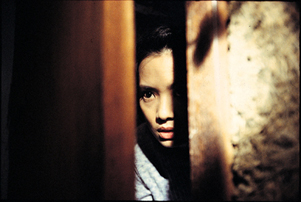Goodbye, Dragon Inn
“Half bitter, half sweet,” swoons Yao Lee over the closing credits of Goodbye, Dragon Inn, and it is a elucidation as simple as it is evocative of Taiwanese director Tsai Ming-Liang’s filmmaking. Tsai has continued to refine his talent at a placid, Ozu-like pace, and his latest film evokes that of the Japanese master: formal but not alienating, heartfel t but not manipulative, and above all gently elegiac with a rich, subdued sense of humor. Its focus, like most of Tsai’s oeuvre, is of human (dis)connection, and by draining the narrative to a poetic minimalism and tying his themes to the unusual subject of cinema attendance, Tsai has fashioned a delicate film glowing of melancholy over the state of cinema and the ephemerality of human amity.
t but not manipulative, and above all gently elegiac with a rich, subdued sense of humor. Its focus, like most of Tsai’s oeuvre, is of human (dis)connection, and by draining the narrative to a poetic minimalism and tying his themes to the unusual subject of cinema attendance, Tsai has fashioned a delicate film glowing of melancholy over the state of cinema and the ephemerality of human amity.
Goodbye, Dragon Inn honors the closing of an old Taiwanese movie theatre. Its last screening is of King Hu’s Dragon Inn, and the martial-arts classic goes all but unseen in the cavernous, dilapidated, leaky theatre. The crowd is small and sporadic. Tsai is clearly honoring not just a different age of filmmaking but a different age of film going-the film’s first scene is either a fantasy or a flashback of Dragon Inn playing to a packed and rapturous audience. But, as sad as it is to witness a minute moment in the passing of classic cinema, it is even more remarkable how unexplored the topic of the spectatorship and community of movie going is, for Goodbye, Dragon Inn is most purely an off-beat, reverent poem to theatre  audiences.
audiences.
Those in attendance at the screening late in the rainy evening are few-an old man and his grandson, a young Japanese tourist looking for companionship alternatively in Hu’s movie and in the theatre audience, and a handful of various apparitions. In one of only two conversations in the entire film, a pensive, well dress man warns the tourist that the theatre is haunted by ghosts, a beautiful, sad description of the dwindled audience. Tsai playfully teases the tourist when a woman seated on the other side of the theatre noisily eating nuts disappears only to reappear behind him, crunching mechanically while captivated by the movie and scaring wits out of the man. Many moments are equally mischievous-a man picking the seat right next to the tourist with the whole of the empty theatre to choose from, the constant interruptions of smoking, bathroom calls, and exits, entrances, and reseatings. The movie theatre appears here as only a temporary rest stop and certainly nothing worth staying in your seat forever for; the sadness of movie and its audience as a completely transitory situation. On a more melancholic note are two more “ghost” attendees, the old man played by Tsai’s regular father figure Tien Miao and Shih Chun-both actors playing themselves, attending a sad, half-hearted revival of a film they both appeared in nearly forty years earlier. Both of them stay for t he entire show, as if leaving midway through would somehow be a breach of etiquette, the shaming of a memory or a life.
he entire show, as if leaving midway through would somehow be a breach of etiquette, the shaming of a memory or a life.
While the cavernous theatre with its empty red velvet seats is the thematic and spatial centerpiece of the film, the utility passages that entwine the screening room have stories of their own. Sadly and somewhat erotically shuffling around the hidden passages, creaky corners, multiple stairways, and flooded halls is the theatre’s disabled ticket woman (Shiang-chyi Chen). She finds little solace in the repetitious duties of her position, and journeys a long way upstairs to give the projectionist (Kang-shen Lee) something special for supper, only to find the room empty but for the sound of the whirling film reels. Later, joy momentarily spills on her face when she sneaks behind the theatre’s screen and watches as a martial heroine elegantly repels several attackers with her swordsmanship, the light popping through the screen’s perforated canvas onto the enraptured face of the sad employee, like a meteor shower of cine-light.
Tsai composes cinematographer Ben-Bong Liao’s textured, precise images like still photographs that glow from their own mystery, the length of each take resting plaintively on the senses of simultaneous kinship and alienation in a movie house, the arbitra riness and solemnity of the audience’s watchful gaze. The narrative is minimal and Dragon Inn does more talking than any of Tsai’s sorrowful characters. Later, Tien Miao laments to his fellow actor that no one goes to see movies anymore, and one hopes that Dragon Inn’s turnout, however small, found some sort of meaning in the screening. Gradually what seems clear is that the importance may not be the film itself. While eulogizing Hu’s bygone era of filmmaking and sadly condemning our era’s appreciation of lost classics, the despair and the hope in Tsai’s film is the unusual interaction, or lack of it, in the theatre’s receding audience. It is in the tentative, elided connection between the male and female theatre employees, the silly, common jokes about weird and obnoxious audience members, and in the strange male wanderings and their restroom comradery. The effect is quiet, minimal, and delivered in a sweet, graceful tone that Yao Lee invokes so well in her now-nostaglic pop lyrics: “Half bitter, half sweet.” It describes the film itself, and it equally describes a look back at what cinema used to be and a look presently to see what it has become.
riness and solemnity of the audience’s watchful gaze. The narrative is minimal and Dragon Inn does more talking than any of Tsai’s sorrowful characters. Later, Tien Miao laments to his fellow actor that no one goes to see movies anymore, and one hopes that Dragon Inn’s turnout, however small, found some sort of meaning in the screening. Gradually what seems clear is that the importance may not be the film itself. While eulogizing Hu’s bygone era of filmmaking and sadly condemning our era’s appreciation of lost classics, the despair and the hope in Tsai’s film is the unusual interaction, or lack of it, in the theatre’s receding audience. It is in the tentative, elided connection between the male and female theatre employees, the silly, common jokes about weird and obnoxious audience members, and in the strange male wanderings and their restroom comradery. The effect is quiet, minimal, and delivered in a sweet, graceful tone that Yao Lee invokes so well in her now-nostaglic pop lyrics: “Half bitter, half sweet.” It describes the film itself, and it equally describes a look back at what cinema used to be and a look presently to see what it has become.


0 Comments:
Post a Comment
Subscribe to Post Comments [Atom]
<< Home